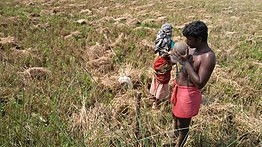Business
Price Woes: Fertiliser subsidy bill set to touch Rs 1.65 lk cr

New Delhi, April 21
The Centre's fertiliser subsidy bill is set to touch an all-time high of Rs 1.65 lakh crore this fiscal against Rs 1.05 lakh crore budgeted, due to an unprecedented rise in the cost of raw materials.
As per Crisil Ratings, in the past two fiscals, it has paid an additional Rs 1.2 lakh crore and increased the budgeted subsidy.
However, the credit ratings agency said that steep rise in raw material prices has been negating this, and another intervention may be needed in this fiscal.
Not doing so would take the subsidy arrears to an all-time high of over Rs 75,000 crore by end of this fiscal, it said.
"Over 85 per cent of the subsidy arrears could be contributed by urea. This is because pooled gas prices - a blend of domestic gas and imported LNG considered for billing to fertilisers plants - had shot up more than 75 per cent last fiscal, and is expected to remain elevated for most part of this fiscal because of the Russia-Ukraine conflict," said Nitesh Jain, Director, Crisil Ratings.
"At the same time, retail prices of urea have stayed put, increasing the government's subsidy burden. This would be despite some respite likely from the commissioning of new domestic capacities that could potentially halve India's import dependence for urea from nearly 28 per cent in fiscal 2021."
At present, the retail selling price (RSP) of urea is fixed by the government.
Besides, to spur farmers to use fertilisers for better crop yield, the government keeps the RSP significantly lower than the market rate, and reimburses the urea makers through subsidy payments.
"While this protects the profitability of urea makers to a large extent, the RSP remaining unchanged despite rising costs will mean the government will have to foot a bigger subsidy bill."
"Likewise, prices of phosphoric acid and rock phosphate - ingredients for non-urea fertilisers1 - have also gone up by 92 per cent and 99 per cent, respectively, in the past 12 months through March 2022."
Furthermore, given that Russia, Belarus and Ukraine are the major suppliers of non-urea fertiliser ingredients, the ongoing conflict will only exacerbate the situation.
"While non-urea makers have hiked prices, it may not be sufficient to cover the escalation in cost. For non-urea fertiliser makers, the government pays subsidy as per the nutrient-based subsidy (NBS) rates, which are yet to be announced for this fiscal. Therefore, a revision in NBS rates bear watching..."
In addition, the credit rating agency predicted a 3 per cent on-year growth in demand for fertilisers and a moderation of raw material and fertiliser prices in the second half of this fiscal.
"If demand is higher than expected, or input prices do not soften even in the second half, the subsidy bill may inch up to Rs 1.8-1.9 lakh crore."

45 seconds ago
Sensex, Nifty open in green over US-India trade talks, Bihar exit polls

5 minutes ago
Pilots, ATCs must report GPS spoofing within 10 minutes: DGCA

6 minutes ago
India reaffirms unwavering support to Bhutan's overall economic development

7 minutes ago
Money supply rises for 6th straight month amid strong stock market: BOK

8 minutes ago
TN to spend Rs 25,100 crore on power purchase to meet rising demand

12 hours ago
"Very important relationship": Trump on swearing-in of Sergio Gor as US Ambassador to India

12 hours ago
Kiran Desai loses out to Hungarian-British author for Booker Prize

12 hours ago
Indian envoy congratulates Sergio Gor on being sworn in as US Ambassador to India

16 hours ago
Cryptocurrency playing key role in drawing Trump closer to Pakistan: Report

16 hours ago
EAM Jaishankar travels to Canada for G7 Foreign Ministers' meeting

19 hours ago
NIA takes over Delhi blast case

21 hours ago
Allu Arjun says 'I wish for peace to prevail once again' after the horrific Delhi blast

21 hours ago
Hema Malini expresses anger over false reports of Dharmendra's demise: 'What is happening is unforgivable'






















